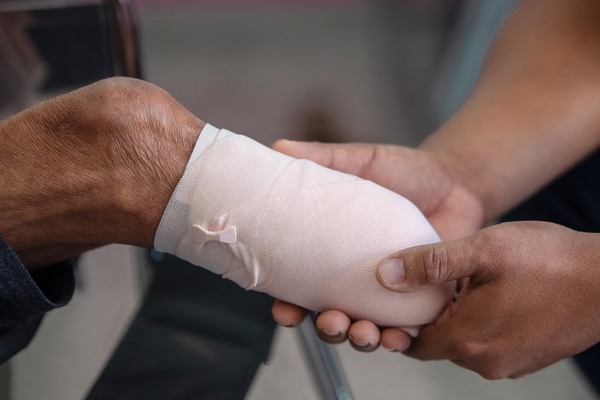
Losing a limb due to an injury can profoundly affect your life. Understanding your rights and the steps to seek compensation is crucial for recovery and justice.
Key Takeaways
- Victims of injuries resulting in amputation due to negligence can seek compensation.
- Legal advice is essential to understand the full value of claims.
- Time limits apply, making prompt action crucial.
Legal Recourse for Catastrophic Injury Victims
We hear a lot about personal injury lawsuits in this country. Every day, people get hurt while simply going about their lives. Some injuries are mild to moderate in nature, but some injuries can completely upend a person’s life. We refer to the latter as catastrophic injuries. Loss of limb falls into the catastrophic category since it is one of the most life-altering injuries a person can experience. Victims often suffer from immense physical and emotional pain while facing a lifetime of expensive medical treatment. If you lose an arm, leg, or other body part due to the negligence of another, the law allows you to seek compensation for amputation losses.
In such cases, it is particularly important to speak with a knowledgeable lawyer who can get to work immediately to protect your rights. The insurance companies see big dollar signs when amputation is involved, and they will try to offer you a low-ball settlement amount quickly before you speak to a lawyer. The amount may sound enticing, but do not agree to a settlement on your own. You need experienced assistance in assessing what your real lifetime losses will be, so you can demand every penny of compensation you deserve for your amputation claim.
What Is the Difference Between Amputation and Dismemberment?
It is helpful for our discussion to understand the difference between amputation and dismemberment. Simply stated, dismemberment happens when a body part becomes detached from your body during an accident. By contrast, a surgeon always performs an amputation. However, a dismemberment may lead to surgical amputation under certain conditions, like if a wound is jagged, mangled, or infected.
Limb Loss Statistics
You may be wondering how prevalent such catastrophic injuries are in the United States. According to the Amputee Coalition:
- The US has about two million people living with limb loss;
- Surgeons perform about 185,000 amputations in the US each year;
- The main cause is a vascular disease like diabetes and peripheral artery disease (54%);
- The second most common cause of amputation is trauma or accidents (45%);
- $8.3 million dollars was spent on hospital costs associated with amputations in 2009; and
- Black Americans have a 4x higher chance of amputation than white Americans.
As you can see, trauma is one of the most common reasons a limb needs to be amputated.
Causes of Traumatic Loss of Limb
Sometimes, an accident can result in damage to a limb that is so severe it warrants amputation. Several types of accidents can lead to amputation claims:
- A heavy object falling onto a limb and crushing it;
- Auto vehicle accidents;
- Motor vehicle accidents;
- Trucking accidents;
- Workplace or farming accidents that result from using heavy equipment or machinery;
- Electrical or chemical burns; and
- Fire, explosions, or fireworks resulting in serious burns.
These types of accidents and more can lead to limb removal or dismemberment and can serve as the basis to demand compensation for amputation.
Costs of Loss of Limb
In 2007, the Journal of Bone and Joint Surgery published an article that studied the lifetime costs for all medical devices, procedures, therapy, and other treatment for amputees.
The study began in 2002 and found that the average lifetime healthcare cost to amputees was $509,275. Adjusted for inflation, that comes out to a current amount of roughly $700,000. And this number did not take pain and suffering, lost wages, or reduced quality of life into consideration.
Legal Options After Amputation or Dismemberment
If your injury resulted from an accident caused by the negligence of another, you should contact a knowledgeable lawyer who has experience in this area promptly. An attorney can help you decide which route to take when seeking compensation for amputation.
If your injury happened at work, you might wish to pursue a workers’ compensation claim. But that may not be your only option. If injured at work, there may be other parties who hold some responsibility. For instance, if faulty equipment at work caused loss of limb, the equipment manufacturer may also be liable for your injuries. Your lawyer can advise you as to the best route to take in such complex situations.
If your injury had nothing to do with your job, the chances are you have a viable personal injury case. For example, if a truck driver ran into your car and that resulted in amputation, you can likely sue the driver and the company they work for. Again, these are complex legal matters that require assessment by an experienced attorney who can guide you as you seek compensation.
Don’t Delay
After losing a limb, you may be suffering from depression or an inability to move forward. Try to resist the impulse to do nothing. Time is of the essence because you only have three years to file your amputation claim based on negligence and even less if you go through workers’ compensation.
Your attorney needs time to dig into the facts of the incident, build a case, and pursue settlement negotiations—regardless of which compensation route you take. Don’t hamper their ability to help you by procrastinating. The sooner they get started on your case, the better.
We Can Help Get the Compensation You Need
Every day, the injury legal team at Brett McCandlis Brown & Connor, PLLC, help people who have been injured by others. We have decades of experience, even in the serious area of accidents that result in amputation or loss of limb. When you have suffered such an enormous setback in life, you need attorneys who are experienced specifically in this area of law.
In the aftermath of such a catastrophic injury, your head may be swimming as you attempt to process what has happened to your life. Your only job right now should be to heal emotionally and physically as much as possible and to learn how to adjust to your new life. Allow us to take the legal burden off of you.
We know how to get you the money you need to carry on with your life, and we will fight every step of the way to get you all of the money you deserve. So don’t delay. Give us a call for a free consultation, or contact us online today.


